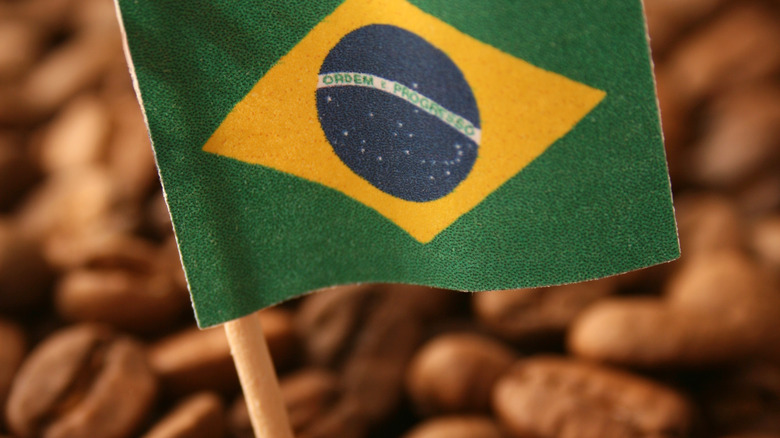Why Brazil Is The Coffee Capital Of The World
Coffee, the bittersweet beverage that awakens senses and soothes souls, hails from all around the globe — but it's particularly prevalent within the "Bean Belt," an area comprised of roughly 70 equatorial countries in Central and South America, Central Africa, India, and Southeast Asia. However, South America's largest nation reigns supreme. Brazil, with its sprawling landscapes and vibrant culture, has deservingly earned its status as the coffee capital of the world. This prestigious ranking is the result of a combination of factors that position Brazil as the planet's dominant coffee producer, namely its geography, climate, rich history, and devotion to innovation.
For starters, Brazil possesses an expansive landmass that accommodates diverse ecosystems, making it ideal for cultivating a variety of coffee beans (which are actually fruit, not legumes). Characterized by assorted climates and altitudes, the terrain provides the optimal conditions for growing multiple types of coffee. The two primary coffee varieties cultivated in Brazil are arabica and robusta, with the former being particularly esteemed for its nuanced flavors. The Brazilian states of Minas Gerais and Bahia are renowned for harvesting arabica beans, which contribute significantly to Brazil's coffee supremacy, while Rondônia is a hub for robusta. The tropical climate yields warm temperatures and abundant rainfall, creating an environment conducive to the rapid growth of coffee plants. The steady weather patterns allow for year-round harvest, ensuring a continuous, reliable supply.
Coffee is deeply ingrained in Brazilian culture
First introduced to Brazil in the 18th century, coffee quickly became a key driver of economic prosperity. Eventually, vast plantations, known as fazendas, became synonymous with the production of superior coffee. The country's dedication to the modernization of farming practices has further propelled its coffee industry forward. Throughout the centuries, Brazil has pioneered advancements such as mechanized harvesting and processing techniques, greatly enhancing overall efficiency and virtuosity.
Moreover, Brazil's influence in the coffee business extends well beyond its domestic borders. As a major player in coffee commerce, Brazil actively participates in the International Coffee Organization through initiatives that shape the commodity's future. For instance, the nation's active engagement in discussions on sustainability and fair trade reflects its commitment to ensuring the long-term viability of the coffee sector.
Brazil's dominance in the global coffee market is evident in its output. According to the Foreign Agricultural Service, an estimated 66 million 60-kilogram bags of coffee will be exported out of Brazil between 2023 and 2024 — a testament to the region's agricultural prowess and ability to meet the ever-thriving demand for coffee. For this, Brazil prides itself as the top exporter of coffee beans, the source of the delightful libation coveted by caffeine enthusiasts worldwide.

